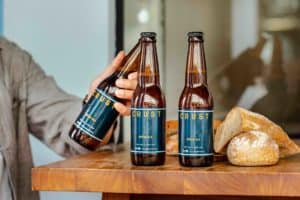It’s fair to say that over the last few years, the mainstream stars of the sustainability show have come from the kitchen. Innovation and technology have enabled alternative, sustainable food and beverage companies to create and promote conscious living in markets, restaurants, supermarkets, and beyond. Singapore-based CRUST Group is one such business, offering beers and non-alcoholic drinks that have been brewed using surplus, upcycled food.
CRUST Group was launched last year with the aim of offering value and innovation via its first product, beer made from leftover bread. Since then, the business has grown all round, from the number of staff members on board to the number of products it offers. We spoke with founder and CEO Travin Singh to find out more about the company and its future plans.
How did CRUST Group begin?
I wanted to build a value-based company that gained profit but was mostly about finding solutions; kind of a reference for how business would be done in the future. I’d been home brewing beers for a while and did a lot of research into the origins of beer. I learnt that the preservation of bread is one of the oldest forms of making beer. That was my eureka moment. I made a few more batches at home, travelled to California to visit breweries, and then came back to Singapore last February. In April, I started CRUST Group. Now we have a team of 14 people based in Singapore, Japan, and Vietnam.
What’s your relationship with sustainability?
I wouldn’t necessarily think of myself as an eco-warrior – sometimes it feels as though people are making the word ‘sustainability’ into a trend – but when I was young, my mother would incorporate any leftovers from dinner into a meal the next day. It wasn’t about sustainability necessarily; it was just how we lived. So, for CRUST Group, sustainability was an ‘a-ha’ moment, not the driving force of the business.
Tell us about the CRUST beers.
We’ve made beers using rice, bread, fruit peels, and plants. We’ve worked with a variety of companies including Tiong Bahru Bakery, whose surplus bread we upcycled into a beer called Beerguette. We’re launching in the Japanese market this year with a rice and bread beer. Something we’re hoping for is to find locally grown tropical plants as an alternative to hops, as hops have to be flown in across thousands of miles from the U.K. and U.S.

At the end of the year, you’re launching a new brand under CRUST Group called CROP. What’s CROP about?
CROP is a non-alcoholic beverage brand and is very much focused on fruits and vegetables. It marks the start of our transition from just a brewing company to a food tech company. We want to create a brand that can grow; for example, one day there might be a CROP sparkling drink or a CROP kombucha.
How has the public responded to CRUST Group?
When we first launched, I think people didn’t totally understand what we were doing. They confused food waste and food loss and thought that we were taking food that had been consumed or used by others and turning it into beer. Actually, we were taking surplus bread that hadn’t been used or sold. People were also asking why just beer and bread, which was a further reason we decided to move into the food technology sector.
How was the transition from brewery to food tech company?
It was challenging for me. I was comfortable as the CEO of a brewery, so becoming the CEO of a food technology company involved a steep learning curve. A few months ago, I had a breakdown. I took a step back and realised that I had been doing too many things because I was so eager to learn, and that I needed to prioritise and delegate. Running a food tech company rather than just a brewing company means I’m still learning all the time – how to manage this many staff or how to do certain things I’ve never done before.
What are CRUST Group’s future plans?
As well as getting CROP out there and launching in Japan, we’re also bringing out two new beers; one will be made from SaladStop!’s surplus pumpkin and quinoa, and the other from Bettr Barista’s stale coffee grounds. In around 6-9 months we’ll also be launching CRUST Media, which will create things like YouTube videos offering simple upcycling recipes.
Our long-term vision, using our current beverage focus as an example, is to be the one out of ten drinks offered at a bar or restaurant, the same way, say, one in ten burgers at restaurants are now made from Impossible meat. We want to partner with airlines, restaurants, bars, etc., show them how to upcycle their own waste, and co-produce with them. However, there are lots of other directions we’d like to explore in future, not just beverages.
Do you have any advice for people who are interested in reducing waste?
I don’t think the onus is just on consumers, businesses have a large part to play as well. At CRUST Group, the way we approach it is by putting the onus on ourselves. There’s a risk of green companies alienating customers because of their intense approach to sustainability. I think the better business model would be to create a product that people are interested in and then move towards education. No one wants to know about incineration and waste out of nowhere, they want a product they can enjoy – and maybe afterwards they’ll be more open to learning about it.

